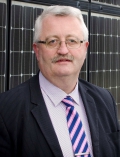- Prospective Applicants
-
Current PhD Researchers
- Careers and Opportunities
- Careers
- Go Global
- Science Shop
-
Supervisors
- Find a PhD
- PhD Manager
This project is funded by:
COP28 pledged to triple the world's renewable energy capacity by 2030 and to double global energy-saving efforts over the same period. For energy efficiency, examples include an over 30 times increase in electric and hybrid light vehicle use, a doubling of building renovation, a nearly 10 times increase in smart meters, and a nearly 10 times increase in the number of heat pump installations.
For heat pumps, domestic and commercial installation processes are well established and yet would always still benefit from system and component improvements, including new and or natural working fluids to address the per- and polyfluoroalkyl substances (known as PFAS) challenges. It is with PFAS that a concern is raised. The International Energy Agency (IEA) Heat Pump Technologies Annex 58, addressing High Temperature Heat Pumps details the significant research and commercial effort to deliver heat pumps in that heat from 100⁰C to 200⁰C and above. There are significant proportions of these systems, both existing and emerging, that use PFAS refrigerants.
Therefore, what working fluids can we utilize to match the operating temperatures of IEA HPT Annex 58, while maintaining or indeed increasing efficiency and while increasing the operating temperature range.
Reversed Brayton Cycles may offer higher temperatures again but a review of materials (and compression lubrication if necessary) reveals a range of results that require further investigation. Pimm et al (2023) noted that a Reversed Joule Brayton heat pump could be utilized for preheating industrial hydrogen with a COP of up to 1.7. Argon (R740) appears to be a viable choice, as confirmed by for example, Vinnemeier et al (2016). Zuhlsdorf et al (2019) modelled R744 to 290⁰C and 140 BarA and a COP of 1.72. Argon compressors (typically in stainless steel and oil-free) can address 40 BarA which can comfortably accommodate 1000⁰C. Such a high-pressure ratios will improve the performance.
We intend to model these systems and understand their practicability of developming ultra high temperature heat pumps for industrial applications.
Applicants should hold, or expect to obtain, a First or Upper Second Class Honours Degree in a subject relevant to the proposed area of study.
We may also consider applications from those who hold equivalent qualifications, for example, a Lower Second Class Honours Degree plus a Master’s Degree with Distinction.
In exceptional circumstances, the University may consider a portfolio of evidence from applicants who have appropriate professional experience which is equivalent to the learning outcomes of an Honours degree in lieu of academic qualifications.
The University is an equal opportunities employer and welcomes applicants from all sections of the community, particularly from those with disabilities.
Appointment will be made on merit.
This project is funded by:
Our fully funded PhD scholarships will cover tuition fees and provide a maintenance allowance of £19,237 (tbc) per annum for three years (subject to satisfactory academic performance). A Research Training Support Grant (RTSG) of £900 per annum is also available.
These scholarships, funded via the Department for the Economy (DfE) and the Vice Chancellor’s Research Scholarships (VCRS), are open to applicants worldwide, regardless of residency or domicile.
Applicants who already hold a doctoral degree or who have been registered on a programme of research leading to the award of a doctoral degree on a full-time basis for more than one year (or part-time equivalent) are NOT eligible to apply for an award.
Due consideration should be given to financing your studies.
Cordin Arpagaus (2023) Industrial Heat Pumps: Technology readiness, economic conditions, and sustainable refrigerants ACEEE Industrial Heat Pump Workshop Online, 11 July 2023.
Benjamin Zuhlsdorf (2023) Industrial heat pumps - development perspectives and demonstration activities, ACEEE Industrial Heat Pumps Workshop Online, 11th July 2023
Sven Klute, Marcus Budt, Mathias van Beek, Christian Doetsch (2024). Steam generating heat pumps – Overview, classification, economics, and basic modeling principles, Energy Conversion and Management, Volume 299, 1 January 2024, 117882
Andrew J. Pimm, Tim T. Cockerill, William F. Gale (2023) Reducing industrial hydrogen demand through preheating with very high temperature heat pumps, Applied Energy, Volume 347, 1 October, 121464
B. Zühlsdorf, F. Bühler, M. Bantle, B. Elmegaard (2019) Analysis of technologies and potentials for heat pump-based process heat supply above 150 °C, Energy Conversion and Management: Volume 2, 100011.
Zahra Mahdi; Jürgen Dersch; Pascal Schmitz; Simon Dieckmann; Ricardo Alexander Chico Caminos; Cristiano Teixeira Boura; Ulf Herrmann; Christian Schwager; Mark Schmitz; Hans Gielen; Yibekal Gedle; Rauno Büscher (2022) Technical assessment of Brayton cycle heat pumps for the integration in hybrid PV-CSP power plants, AIP Conference Proceedings.
Qingyang Liu, Jiong Qian, Richard Barker, Chun Wang, Anne Neville, Frederick Pessu (2022) Effect of thermal cycling on the corrosion behaviour of stainless steels and Ni-based alloys in molten salts under air and argon, Solar Energy, Volume 238, Pages 248-257
Submission deadline
Monday 24 February 2025
04:00PM
Interview Date
April 2025
Preferred student start date
15 September 2025

Telephone
Contact by phone
Email
Contact by email